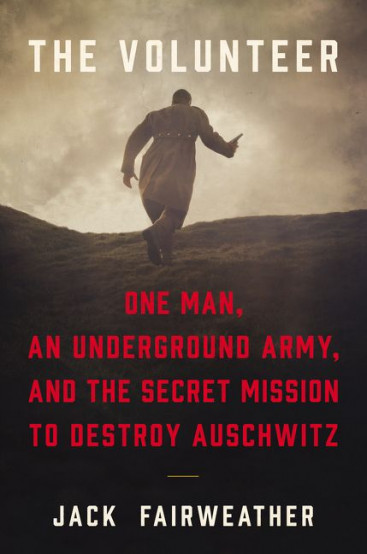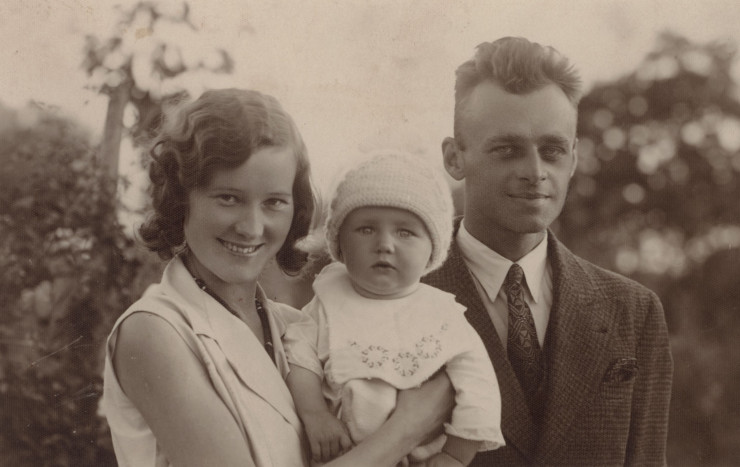"The Volunteer" - remarkable story of Captain Witold Pilecki - Instytut Pileckiego
"The Volunteer" - remarkable story of Captain Witold Pilecki
The book by Jack Fairweather, which will come out in June, tells the story of Witold Pilecki – a remarkable Pole, volunteer to Auschwitz and one of the greatest heroes of the Second World War.
The Volunteer by Jack Fairweather is the remarkable story of Captain Witold Pilecki, one of the greatest heroes of the Second World War. Largely unknown outside Poland, Fairweather brings his story to life with unparalleled research and compelling story-telling. The Pilecki Institute will be hosting the global launch of The Volunteer in conjunction with Harper Collins.

The Greatest Hero
In the summer of 1940, after the German occupation of Poland, an underground operative called Witold Pilecki accepted a mission to infiltrate Auschwitz in order to uncover the fate of thousands of people being deported to a new concentration camp. His mission was to report on Nazi crimes and raise a secret army to stage an uprising.
Once incarcerated, Pilecki witnessed - and himself suffered - the inconceivably sadistic mistreatment of inmates by the Nazis. He set to work gathering a secret network of likeminded Polish prisoners who were determined to fight back through subterfuge. But their first missives about the atrocities, dangerously smuggled to the exiled Polish government in London, seemed to fall on deaf ears, and their plea that the British bomb Auschwitz went unheeded.

In July, 1942, the first Jewish transport to be subjected to a selection for the gas chambers arrived from Slovakia and Auschwitz quickly morphed from a horrendous labor camp to the site of the mass murder of Europe’s Jews. Pilecki gathered intelligence of the Germans’ greatest crime, but realized that the best way to make the case for action would be in person – by escaping from the camp.
“I set out to understand what qualities set this Pole apart and what made him risk everything to help his fellow men,” says Jack, “How did an ordinary man find the moral capacity to piece together and expose the Nazis’ greatest crimes while others turned away?”
In a feat as daring and unbelievable as his initial voluntary imprisonment, he broke out of the camp and delivered to Warsaw some of the first verification of the Jewish extermination. In doing so, he presented Allied commanders with the opportunity to save hundreds of thousands of Jewish lives. Free from the concentration camp, Pilecki continued to work underground against the Nazis. But, transferring the spirit of resistance against the country’s Soviet “liberators” after the war, this unabashed Polish freedom fighter would be betrayed, ultimately meeting the tragic fate he managed to avoid at the Germans’ hands.
Pilecki rediscovered
"Jack Fairweather’s work adds, in crucial ways, to the knowledge of the history of World War II. Witold Pilecki’s life and actions, largely unknown outside Poland, deserve wide recognition and The Volunteer provides a superbly written, carefully researched and simply gripping account of one of the twentieth century’s great heroes. It allows international audiences to discover Pilecki as the historical figure of global stature and real-life superhero that he was—a man who voluntarily went undercover to Auschwitz to give witness to the crimes of the German Nazis. Yet, Jack Fairweather’s The Volunteer offers more than an engrossing narrative of historical events. What transpires through the pages of his book is the enduring relevance of Pilecki—not just dates and places, but character and integrity. In The Volunteer, we find an exceptional account of courage, fortitude and sacrifice. The fact that Fairweather writes as someone from outside Polish culture gives him a perspective which adds to the book’s relevance. In the end, it is the combination of the author’s painstaking reconstruction of the man and his times and the in-depth study of Pilecki’s character that make the book a unique and welcome one" says Prof. Piotr Wilczek, the Ambassador of Poland to the United States.
"Jack Fairweather does a marvelous job introducing Cpt. Witold Pilecki to a worldwide audience as a universal symbol of courage during the Holocaust. Fairweather’s original research reveals the calculated cynicism of Poland’s allies who chose not to listen to his call for action to bomb Auschwitz from where he smuggled his alarming reports. Pilecki was condemned to death by communist Poland after WW2 and deleted from history. I hope his story will find a global readership and inspire a new generation with the hope that even in mankind’s darkest hour, courage and dignity can prevail." says Maciej Golubiewski, Consul General of the Republic of Poland in New York.
"After the War, the communists wanted to obliterate the memory of this Polish war hero. Pilecki was sentenced to death in a show trial and buried at a still unidentified location.” says Dr. Wojciech Kozłowski, Director of the Pilecki Institute – a research center dealing with totalitarian regimes in the 20th century. “This book sheds light on a remarkable man who has remained virtually unknown to the world. With assistance from the Institute, Jack Fairweather gained access to previously hidden diaries, accounts of family members and camp survivors, and recently declassified files. The result is a vivid, movie-like description of Pilecki’s exploits. I’ve read the book at one sitting and I must say that it is an enthralling story of a man who risked his life to change the course of the biggest war in human history”, concludes Wojciech Kozłowski.
Jack Fairweather
A graduate of Oxford University and a correspondent for the Washington Post and the Daily Telegraph, where he was the paper’s Baghdad and Persian Gulf bureau chief. His reporting while an embedded reporter during the Iraq invasion won him the prestigious British Press Award (the British equivalent to the Pulitzer Prize). He now lives in Vermont, writing history books and raising three daughters. The author of The War of Choice and The Good War.
See also
- Competition for the position of Adjunct in the Humanities, Department for the study of Nazism and German occupation during the Second World War
News
Competition for the position of Adjunct in the Humanities, Department for the study of Nazism and German occupation during the Second World War
We invite you to participate in the competition for the position of Adjunct in the Humanities, Department for the study of Nazism and German occupation during the Second World War.
- PORTRAITS | Adam Bałdych Quintet
News
PORTRAITS | Adam Bałdych Quintet
“Portraits” is a moving story told through sound, in which jazz meets history and individual fates intertwine with the collective experience.
- Competition for the position of Adjunct in the Humanities
News
Competition for the position of Adjunct in the Humanities
Competition for the position of Adjunct in the Humanities, Department for the study of Nazism and German occupation during the Second World War at the Witold Pilecki Institute of Solidarity and Valor.
- Merry Christmas!
News
Merry Christmas!
On the occasion of Christmas, we wish you all the best and every success in 2026.
- The Lemkin Laboratory – the Pilecki Institute and the Mieroszewski Centre sign cooperation agreement
News
The Lemkin Laboratory – the Pilecki Institute and the Mieroszewski Centre sign cooperation agreement
- 2025 | Michał Bilewicz, „Traumaland. Polacy w cieniu przeszłości"
News
2025 | Michał Bilewicz, „Traumaland. Polacy w cieniu przeszłości"
Michał Bilewicz’s “Traumaland. Polacy w cieniu przeszłości” (Wydawnictwo MANDO/Wydawnictwo WAM) won the Witold Pilecki International Book Award in the “academic history book” category.
- 2025 | Emil Marat „Bratny. Hamlet rozstrzelany"
News
2025 | Emil Marat „Bratny. Hamlet rozstrzelany"
The book “Bratny. Hamlet rozstrzelany” (Wydawnictwo Czarne) won the Witold Pilecki International Book Award in the “historical reportage” category.
- Maksym Eristavi, Russian Colonialism 101. How to Occupy a Neighbor and Get Away with It. An Illustrated Guide
News
Maksym Eristavi, Russian Colonialism 101. How to Occupy a Neighbor and Get Away with It. An Illustrated Guide
Maksym Eristavi’s “Russian Colonialism 101. How to Occupy a Neighbor and Get Away with It. An Illustrated Guide” (IST Publishing) won the the Witold Pilecki International Book Award in the “special prize” category.
- The Witold Pilecki International Book Award: Bilewicz, Marat and Eristavi winners of the Institute’s 5th competition for best history book
News
The Witold Pilecki International Book Award: Bilewicz, Marat and Eristavi winners of the Institute’s 5th competition for best history book
The Witold Pilecki International Book Awards were presented during a ceremony on Thursday 11 December, in the auditorium of the Pilecki Institute.
- Conference summary “Die Haltung der deutschen Minderheiten im besetzten Europa (1939–1945). Forschungsmethoden, soziale Kontexte und Nachkriegsfolgen”
News
Conference summary “Die Haltung der deutschen Minderheiten im besetzten Europa (1939–1945). Forschungsmethoden, soziale Kontexte und Nachkriegsfolgen”
On 20–21 November 2025, an international academic conference was held in Berlin and addressed issues of the attitudes of the German population during the occupation and their postwar fate.
- Results of the Competition for the position of Manager of the Extraneous Branch of the Witold Pilecki Institute of Solidarity and Valor in Berlin
News
Results of the Competition for the position of Manager of the Extraneous Branch of the Witold Pilecki Institute of Solidarity and Valor in Berlin
Warsaw, 20 November 2025 | Announcement of the results of the Competition for the position of Manager of the Extraneous Branch of the Witold Pilecki Institute of Solidarity and Valor in Berlin.
- Nominations for the Witold Pilecki International Book Award 2025 (fifth edition)
News
Nominations for the Witold Pilecki International Book Award 2025 (fifth edition)
We know the authors nominated for the fifth edition of the Witold Pilecki International Book Award! Out of 60 submissions, the Awards Committee has selected 12 publications to compete in three categories.